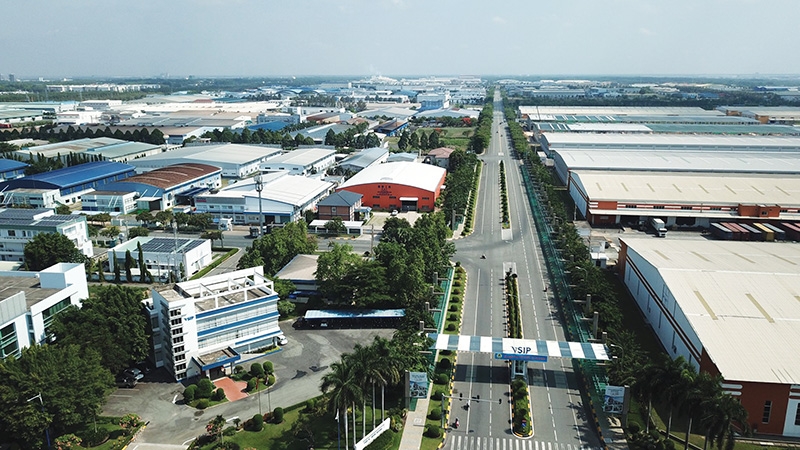Vietnam the hotspot for Singaporean businesses
 |
| While Vietnam offers human resources, Singaporean partner companies bring technology and knowhow to the table, photo: Le Toan |
While numerous countries are engrossed in the fight against COVID-19, resuming international flight routes and opening the market is good news for not only the country but also overseas investors. The Vietnam-Singapore online investment promotion conference themed “Leveraging on Vietnam for your investments” last week, which was joined by 500 representatives from the Lion Island, indicates how hot Vietnam is.
Douglas Foo, president of the Singapore Manufacturing Federation (SMF) and co-chairman of the Vietnam-Singapore Business Council confirmed, “Thousands of Singaporean manufacturers are interested in Vietnam, which is an ideal destination to invest in manufacturing, particularly in smart cities, energy, and new areas involving Industry 4.0 and startups.”
The SMF champions the Singaporean manufacturing sector. With over 3,000 corporate members ranging from multinational corporations to small- and medium-sized enterprises (SMEs), such as Absotech, Daishin Engineering, Equiptest Engineering, Flexspeed Technology, and Hydratech Industries, the federation, which has successfully carried out a myriad of mutually beneficial investment and trade promotion activities with regional countries, will bring billion-dollar investment projects to Vietnam in the time coming.
Taking note of the free trade agreements that Vietnam has signed with partners, as well as the agreements that both countries are party to, Foo highlighted the Comprehensive and Progressive Agreement for Trans-Pacific Partnership as a powerful driver of cooperation.
He said the agreement will enable tariff eliminations for many products and offer businesses from the two countries greater opportunities to pool their respective capabilities and partner up to bid for government projects.
Meanwhile the upcoming Regional Comprehensive Economic Partnership will also lower trade barriers and improve market access for goods and services, enhance transparency in trade and investment, as well as facilitate ASEAN SMEs to join global and regional supply chains.
“Singaporean manufacturers desire to collaborate with Vietnamese counterparts and work together to expand business across new frontiers made by existing and upcoming agreements, as well as the reopening of markets,” he added.
Last week, some international flights connecting Vietnam to Japan, South Korea, and Taiwan have been resumed for non-recreational visitors (such as students, employees, and business visitors), in addition to simplified immigration procedures and quarantine requirements. These moves made it easier for foreign investors to directly explore the market and make investments.
Deputy Minister of Planning and Investment Tran Quoc Phuong said that opening the market will accelerate economic recovery and development in the new normal. “Vietnam encourages Singaporean companies to invest in high-technology sectors, innovation centres, research and development facilities, infrastructure in industrial zones (IZs), as well as the processing and manufacturing industries, supporting industries, and the equitisation of state-owned enterprises,” he said.
Singaporean investors have found success in infrastructure and IZ development in Vietnam. Vietnam-Singapore Industrial Park, a joint venture between a Singaporean consortium led by Sembcorp Development Ltd. and local group Becamex Corporation, is developing nine projects covering 8,600 hectares in total and has grown into a symbol of the two countries’ friendship. Besides this, Singaporean names like Ascendas, Boustead Projects Ltd., and Mapletree also operate large-scale industrial property projects in Vietnam.
Utilising the strengths of Singaporean investors, Vietnamese authorities can access valuable expertise as well as advanced technologies for infrastructure development, industrial clusters, and smart cities.
“While Singapore has advantages in financial resources and science-technology knowhow, Vietnam has market potential, land, and human resources. There are great opportunities for cooperation and investment to capture the gains of these synergies,” stated Tao Thi Thanh Huong, Vietnamese Ambassador to Singapore.
She also called on Singaporean SMEs to explore investment opportunities in many cities and provinces in Vietnam, besides big cities like Hanoi, Ho Chi Minh City, and the central city of Danang, where there is little vacant land left and competition is quite fierce. “Vietnam welcomes all Singaporean investors and corporations to invest in its cities and provinces that offer great development potential and ample land, along with strong support from the local government to ensure the good performance of investment projects,” Huong added.
Singapore is now the third-largest foreign investor in Vietnam with more than $55 billion in the total investment capital and 2,554 projects. Especially, in the first eight months of the year, Singapore was the largest investor with $6.54 billion in registered investment, making up 33.5 per cent of the country’s total foreign investment inflows. Singapore is also a country through which other foreign investors invest in Vietnam, with $5.75 billion in the total investment by almost 100 projects from South Korean, the United States, and Taiwan.
What the stars mean:
★ Poor ★ ★ Promising ★★★ Good ★★★★ Very good ★★★★★ Exceptional
Related Contents
Latest News
More News
- Japanese business outlook in Vietnam turns more optimistic (January 28, 2026 | 09:54)
- Foreign leaders extend congratulations to Party General Secretary To Lam (January 25, 2026 | 10:01)
- 14th National Party Congress wraps up with success (January 25, 2026 | 09:49)
- Congratulations from VFF Central Committee's int’l partners to 14th National Party Congress (January 25, 2026 | 09:46)
- 14th Party Central Committee unanimously elects To Lam as General Secretary (January 23, 2026 | 16:22)
- Worldwide congratulations underscore confidence in Vietnam’s 14th Party Congress (January 23, 2026 | 09:02)
- Political parties, organisations, int’l friends send congratulations to 14th National Party Congress (January 22, 2026 | 09:33)
- Press release on second working day of 14th National Party Congress (January 22, 2026 | 09:19)
- 14th National Party Congress: Japanese media highlight Vietnam’s growth targets (January 21, 2026 | 09:46)
- 14th National Party Congress: Driving force for Vietnam to continue renewal, innovation, breakthroughs (January 21, 2026 | 09:42)

 Tag:
Tag:




















 Mobile Version
Mobile Version